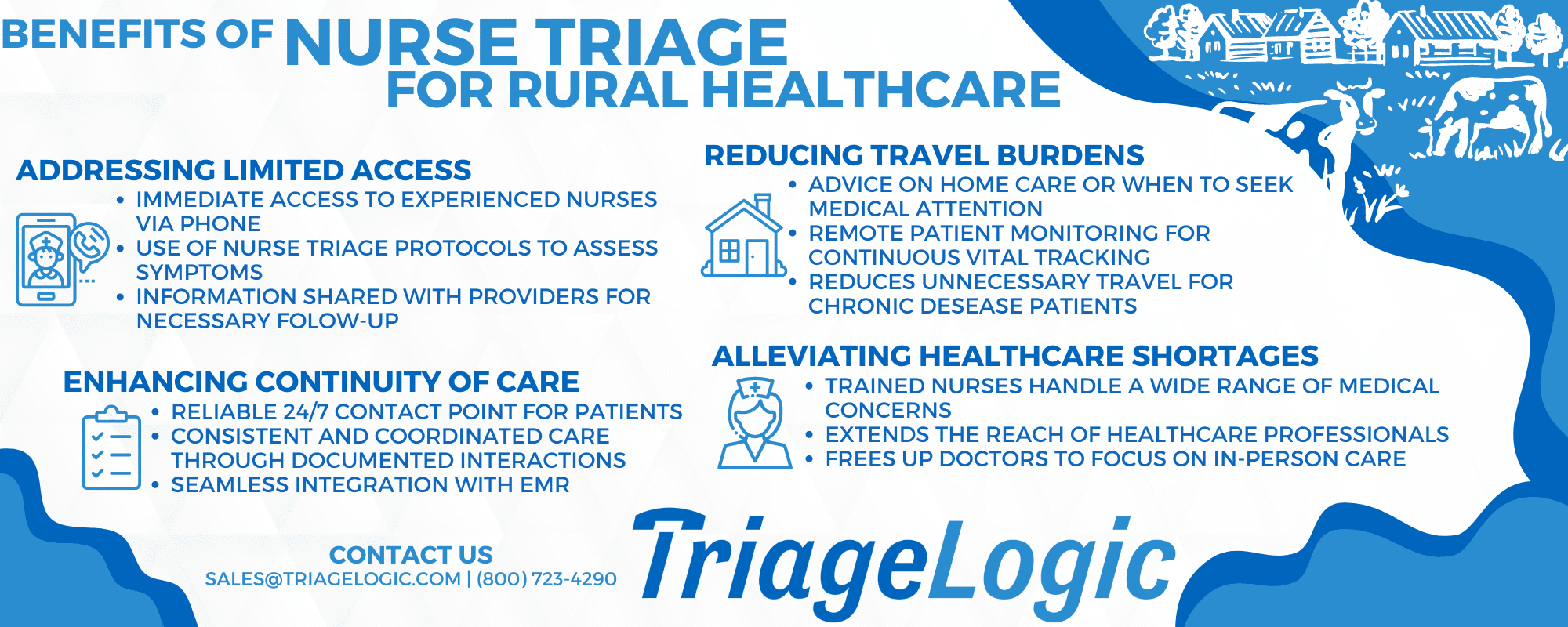Do you have patients in rural communities who struggle with access to care? By leveraging telephone nurse triage, your practice can give them professional advice and support that can guide their decisions on when to seek medical treatment. Let’s explore how triage nurses can overcome the typical challenges of rural health care.
Addressing Limited Access in Rural Health Care
A large percentage of rural patients have to cope with a lack of available medical facilities. This makes them more likely to delay going to their doctors or addressing potentially urgent symptoms.
TriageLogic’s telephone nurse triage service mitigates this problem by providing immediate access to experienced nurses. They use nurse triage protocols to assess the severity of patient symptoms and determine the appropriate levels of care. As long as patients living in remote areas have access to working phones, they can call a triage line for free from the comfort of their own homes. Not only will patients understand their symptoms better, but nurses can also share that information directly with providers when those patients need to be seen.
Reducing Patient Travel Burdens
Patients with chronic disease are at even greater risk in rural communities. The American Heart Association notes that they have “higher rates of tobacco use, physical inactivity, obesity, diabetes and high blood pressure.” For many of them, the time, cost, and physical strain can often deter them from seeking treatment.
Nurse triage offers a convenient and accessible alternative by recommending appropriate actions like home care, scheduling a doctor’s appointment, or seeking immediate medical attention. This helps patients know when they should and shouldn’t make the effort to travel.
Practices may also consider implementing a remote patient monitoring (RPM) program that uses wearable sensors to continuously record patient vitals while they’re at home. Triage nurses can review this information daily and contact patients if their symptoms begin to worsen.
Alleviating Healthcare Shortages
Like most of the industry, rural health care also suffers from a shortage of qualified doctors, nurses, and specialists. This can lead to longer wait times for appointments and limited access to specialized care.
TriageLogic’s Nurse Triage On Call (NTOC) service addresses this issue by extending the reach of healthcare professionals. Nurses on the triage line are trained to handle a wide range of medical questions and concerns that patients often ask their doctors. This gives rural patients timely and accurate medical guidance while simultaneously giving doctors more time to focus on in-person care.
The end result? Practices make the most of their limited resources.
Enhancing Continuity of Care
Continuity of care is vital to the well-being of all patients, but maintaining it in rural health care settings can be especially difficult when practices have limited in-house phone coverage.
Telephone nurse triage fills this need as a reliable point of contact for patients 24/7. Nurses can provide ongoing support, monitor symptoms, and ensure that patients receive consistent and coordinated care. Their software can be used to document patient interactions and share them with the appropriate providers — even if patients need to go to urgent care or an emergency room.
Seamless EMR Integration
For healthcare practices utilizing EMR systems with web-based access like EpicCare Link, integrating nurse triage software offers a significant advantage. By connecting these platforms, crucial patient information like current medications and allergies can be seamlessly pulled into each triage assessment. This not only saves valuable time for nurses, but also enhances the accuracy and comprehensiveness of the triage process. This ability to directly attach triage notes to a patient’s chart reflects the continuity of care discussed above, and eliminates the need for manual data entry.
Encouraging Patient Self-Care
Patients may not take an active role in their own health management when they live farther away from their doctors. Their isolation makes it even more important for them to have an accurate source of medical information and guidance.
TriageLogic’s telephone nurse triage service is always available to help them make more-informed decisions about their care. Nurses can educate patients about their conditions, offer advice on lifestyle modifications, and provide instructions on home care when applicable. This gives rural patients the knowledge and skills they need to manage their own health proactively, reducing the reliance on in-person visits, and improving overall health.
Enhancing Patient Trust and Satisfaction
Above all, you want patients to trust your medical advice, and to know that they have professionals they can talk to when they have concerns. Since health issues often happen after regular office hours, a 24/7 nurse line will give your patients peace of mind.

Let’s Improve Rural Health Care Together
TriageLogic’s telephone nurse triage service is a game-changer for patients living in rural areas. By offering access to experienced nurses, reducing travel burdens, alleviating the impact of healthcare shortages, enhancing continuity of care, improving patient education, and enhancing patient trust, we can help your rural patients receive the care they need, when they need it.
Contact us today to learn more about a customized program for your practice.
About TriageLogic
TriageLogic is a URAC-accredited, physician-led provider of top-quality nurse telehealth technology, remote patient monitoring, and medical call center solutions. Founded in 2007, the TriageLogic Group now serves more than 22,000 physicians and covers over 42 million lives nationwide.





